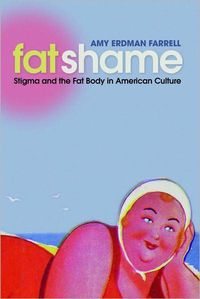

Purchase
Stigma and the Fat Body in American Culture
New York University Press
May 2011
On Sale: May 2, 2011
224 pages
ISBN: 0814727697
EAN: 9780814727690
Hardcover
Add to Wish List
Non-Fiction
To be fat hasn't always occasioned the level of hysteria
that this condition receives today and indeed was once
considered an admirable trait. Fat Shame: Stigma and the Fat
Body in American Culture explores this arc, from veneration
to shame, examining the historic roots of our contemporary
anxiety about fatness. Tracing the cultural denigration of
fatness to the mid 19th century, Amy Farrell argues that the
stigma associated with a fat body preceded any health
concerns about a large body size. Firmly in place by the
time the diet industry began to flourish in the 1920s, the
development of fat stigma was related not only to cultural
anxieties that emerged during the modern period related to
consumer excess, but, even more profoundly, to prevailing
ideas about race, civilization and evolution. For 19th and
early 20th century thinkers, fatness was a key marker of
inferiority, of an uncivilized, barbaric, and primitive
body. This idea—that fatness is a sign of a primitive
person—endures today, fueling both our $60 billion “war on
fat” and our cultural distress over the “obesity epidemic.” Farrell draws on a wide array of sources, including
political cartoons, popular literature, postcards,
advertisements, and physicians' manuals, to explore the link
between our historic denigration of fatness and our
contemporary concern over obesity. Her work sheds particular
light on feminisms' fraught relationship to fatness. From
the white suffragists of the early 20th century to
contemporary public figures like Oprah Winfrey, Monica
Lewinsky, and even the Obama family, Farrell explores the
ways that those who seek to shed stigmatized
identities—whether of gender, race, ethnicity or class—often
take part in weight reduction schemes and fat mockery in
order to validate themselves as “civilized.” In sharp
contrast to these narratives of fat shame are the ideas of
contemporary fat activists, whose articulation of a new
vision of the body Farrell explores in depth. This book is
significant for anyone concerned about the contemporary “war
on fat” and the ways that notions of the “civilized body”
continue to legitimate discrimination and cultural oppression.
Comments
No comments posted.
Registered users may leave comments.
Log in or register now!
| 


 © 2003-2024 off-the-edge.net
all rights reserved Privacy Policy
© 2003-2024 off-the-edge.net
all rights reserved Privacy Policy